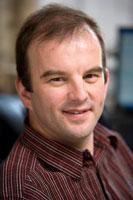Some months ago, I wrote a short piece for the e-zine, Reformation 21 , about the tendency of Reformed Christians over the last twenty or so years to be rather embarrassed about their heritage and to be continually fretting about whether they are relevant or not.
Frankly, Machen’s worrier children seem to have spent more time apologizing for, or even trying to hide, their theological and ecclesiastical history than appropriating it and applying it. “I’m Reformed but…..’ is almost a liturgical response in some quarters to questions about personal beliefs. Hard to imagine a credible Catholic or Eastern Orthodox person giving a similar response. In my experience, they understand the warts-and-all of their respective traditions, but they face them honestly and tend not to be embarrassed to be upfront about who and what they are.
Well, if Time magazine is to be believed, the worrier children can stop wringing their hands, shave off their soul patches, put aside their candles and censer bowls, and start reading Calvin, Owen, Edwards, Warfield and Machen once again because, ironically, this kind of seemingly Paleolithic activity puts them on the cutting edge of Christianity in North America.
Indeed, Time has listed neo-Calvinism as number three in its list of ten things that are shaping the world today. Perhaps those who speak of regeneration are actually more in tune with the Christian Zeitgeist than those who talk endlessly about their ‘journeys.’
To those of us who believed all along that – well, traditional Reformed doctrine basically got it right on all the key points, the fact that Christianity is finding new vitality by revisiting the old paths is no surprise. Alternatives have come and gone, but the old biblical gems of divine sovereignty, human depravity, atonement, regeneration, etc. keep coming back, making sense of both the Bible’s testimony and human experience of the world. It is also 'preachable' in a way that the alternatives – even, or perhaps, especially, those alternatives which make such a noise about preaching, kerygma and dynamism – are not.
This is surely one of the ironies of the neo-orthodox challenge to evangelicals, of the last century: the allegedly static “God-in-box” of the old orthodoxies tends to be somewhat more existential in the preaching than the nebulous God whose being is always, apparently, in his becoming (sic), as even a cursory comparison of respective churches and contemporary preaching will reveal.
Yet while we should be encouraged that Calvinism is clearly far from dead and buried, we must make no room for complacency. It is interesting that the Time article ultimately focuses more on personalities than on churches, presumably reflecting the more-or-less naïve observations of the writer as he looks at the contemporary scene. Could it be that this is a movement driven less by orthodoxy and more by the American idiom of ubiquitous celebrity and noise, and people’s desire to follow the big personality with all the answers?
The real proof of the revival of interest in Reformed theology and its impact within the churches will not be the emergence of charismatic leaders; surely it will be that, over time, these charismatic leaders will fade in comparison to the Spirit-called and constituted church herself and above all to the Lord Jesus Christ who is the One to whom the Spirit witnesses.
A revival of Reformed theology which simply terminates on big shots, on ministries named after individuals, on ministers who are bigger than their congregations and denominations, on personalities and conferences and media dog-and-pony shows, will have terminated on something less than the Spirit-given object of devotion to which the path of biblical, Reformed theology leads: the Lord Jesus Christ himself, the one author and finisher of our salvation.







